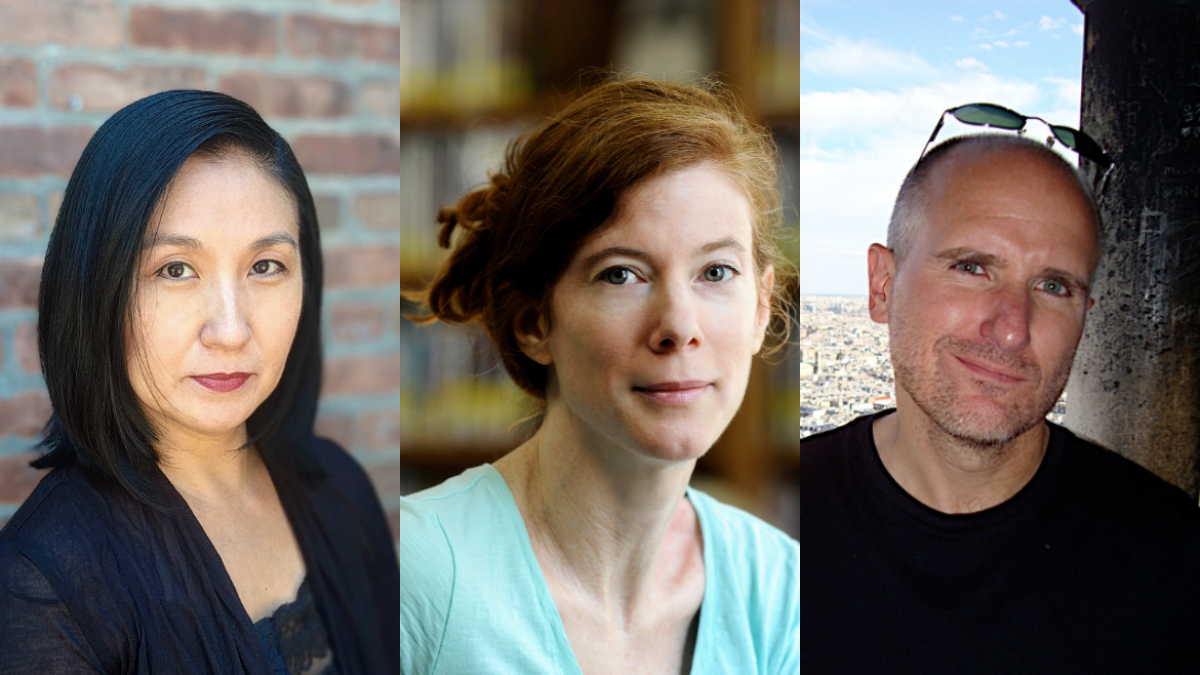Arizona State University’s New College of Interdisciplinary Arts and Sciences is led by a diverse team of renowned faculty who work across disciplinary boundaries to produce innovative research.
New College has named a new associate dean and two new directors to help shape the future of the college and the School of Humanities, Arts and Cultural Studies.
“These outstanding leaders bring years of leadership experience in New College and elsewhere that will allow them to continue to take New College and West campus to the next level,” said Todd Sandrin, dean of New College and vice provost of ASU's West campus. “Their innovative approach to all they do will continue to ensure that New College is always new.”
Meet the newest leaders of New College:

Marianne M. Kim, associate director of the School of Humanities, Arts and Cultural Studies
Kim is a Korean American interdisciplinary artist working in screendanceA form of dance that combines cinematography and choreography., multimedia installation, choreography and performance art. She joined New College in 2006 as assistant professor of interdisciplinary arts and performance in the School of Humanities, Arts and Cultural Studies.
Her areas of research include the disorienting effects of technologized labor, cultural identity, consumerism and most recently the forces within industrial food production and promotion that mediate race, gender and bodies. Her work has been recognized with a number of awards and has been shown in museums and galleries around the world.
Kim received her master’s degree in fine arts with an emphasis on choreography and technology from the University of California, Los Angeles and her bachelor’s degree in theater from Northwestern University. Her appointment as associate director of the School of Humanities, Arts and Cultural Studies began on July 1.
"I look forward to supporting our new director and the community of world-class artists and scholars within the School of Humanities, Arts and Cultural Studies,” Kim said. “This is an exciting time for the school and New College. I'm happy to be participating in this new role."

Miriam Mara, director of the School of Humanities, Arts and Cultural Studies
Mara investigates contemporary Irish literature and film. She joined New College in 2021 as a professor in the School of Humanities, Arts and Cultural Studies, and she has been with ASU since 2016.
During the 2016–17 academic year, Mara collected interview data from health care professionals in Kenya as part of a Fulbright U.S. Scholar award. This culminating piece followed a preliminary analysis of Kenyan medical documents and the fiction of Kenyan author Margaret Ogola. The resulting book, “Globalism and Gendering Cancer,” was published by Routledge in 2020.
She is currently expanding work on embodiment and identity in Irish literature with a new book, “Food Sovereignty in Post-Celtic Tiger Ireland,” which will analyze agricultural and ecological practice as well as a group of contemporary Irish texts about returning to farm life. She was named a 2019–20 Institute for Humanities Research Fellow to build this project.
Mara received her PhD in English from the University of New Mexico, her master’s degree in English from University of North Carolina at Greensboro and her bachelor’s degree in international studies from Jacksonville University. Her appointment as director of the School of Humanities, Arts and Cultural Studies began on July 1.
“What I most anticipate is supporting faculty in their goals," Mara said. "I’m also excited to implement ideas garnered during the reimagining process.”

Stephen Toth, associate dean of New College Academic Enterprise
Toth is a professor of modern European history at ASU and has been with the university for 21 years. His first book, “Beyond Papillon: The French Overseas Penal Colonies,” was published by the University of Nebraska Press in 2006.
His second book, “Mettray: A History of France’s Most Venerated Carceral Institution,” was published by Cornell University Press in 2019. Toth's research has appeared in numerous international journals, and he has been the recipient of research grants from the National Endowment for the Humanities and the American Philosophical Society.
He has appeared as an expert commentator on a National Geographic documentary on Vietnam’s Con Dao island prison and will appear in an episode of the History Channel documentary series “Great Escapes” hosted by Morgan Freeman.
Toth received his PhD in modern European history from Indiana University, his master’s degree in history from ASU and bachelor’s degrees in history and journalism from the University of Nebraska Omaha. His appointment as associate dean of New College began on July 1.
“Over the course of the last five years we’ve seen New College grow dramatically, and I look forward to working closely with faculty and leadership on the development of new programs and initiatives that will continue to expand our reach while also deepening our engagement with the West Valley community,” Toth said.
More Arts, humanities and education

ASU’s Humanities Institute announces 2024 book award winner
Arizona State University’s Humanities Institute (HI) has announced “The Long Land War: The Global Struggle for Occupancy Rights” (Yale University Press, 2022) by Jo Guldi as the 2024…

Retired admiral who spent decades in public service pursuing a degree in social work at ASU
Editor’s note: This story is part of coverage of ASU’s annual Salute to Service.Cari Thomas wore the uniform of the U.S. Coast Guard for 36 years, protecting and saving lives, serving on ships and…

Finding strength in tradition
Growing up in urban environments presents unique struggles for American Indian families. In these crowded and hectic spaces, cultural traditions can feel distant, and long-held community ties may be…
